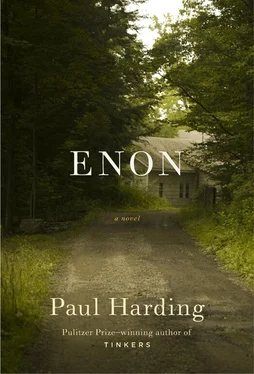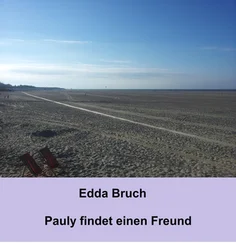Paul Harding - Enon
Здесь есть возможность читать онлайн «Paul Harding - Enon» весь текст электронной книги совершенно бесплатно (целиком полную версию без сокращений). В некоторых случаях можно слушать аудио, скачать через торрент в формате fb2 и присутствует краткое содержание. Жанр: Современная проза, на английском языке. Описание произведения, (предисловие) а так же отзывы посетителей доступны на портале библиотеки ЛибКат.
- Название:Enon
- Автор:
- Жанр:
- Год:неизвестен
- ISBN:нет данных
- Рейтинг книги:3 / 5. Голосов: 1
-
Избранное:Добавить в избранное
- Отзывы:
-
Ваша оценка:
- 60
- 1
- 2
- 3
- 4
- 5
Enon: краткое содержание, описание и аннотация
Предлагаем к чтению аннотацию, описание, краткое содержание или предисловие (зависит от того, что написал сам автор книги «Enon»). Если вы не нашли необходимую информацию о книге — напишите в комментариях, мы постараемся отыскать её.
Powerful, brilliantly written, and deeply moving Paul Harding has, in Enon, written a worthy successor to Tinkers, a debut which John Freeman on NPR called "a masterpiece." Drawn always to the rich landscape of his character's inner lives, here, through the first person narrative of Charlie Crosby (grandson to George Crosby of Tinkers), Harding creates a devastating portrait of a father trying desperately to come to terms with family loss.
Enon — читать онлайн бесплатно полную книгу (весь текст) целиком
Ниже представлен текст книги, разбитый по страницам. Система сохранения места последней прочитанной страницы, позволяет с удобством читать онлайн бесплатно книгу «Enon», без необходимости каждый раз заново искать на чём Вы остановились. Поставьте закладку, и сможете в любой момент перейти на страницу, на которой закончили чтение.
Интервал:
Закладка:
Kate says to the girl, “You are Sarah.” The girl raises the little yellow bird in her hand to her lips and whispers a syllable to it. The bird nods and flies away, behind the hill, toward the setting sun.
The girl says to Kate, “And you are Kate.” Kate suddenly understands that she and young Sarah Good are together in a suspended moment, a small eddy or niche set aside but within all the compounded times of Enon, which are always confluent and permeative. Sarah stares at Kate, in a manner that is patient and deeply familiar, and that frightens Kate. Kate begins to cry, and Sarah reaches out and takes one of her hands in both of her own. Sarah strokes Kate’s hand as Kate sobs, but her expression does not change, and even her hands stroke Kate’s in a perfunctory way, as if she is consoling someone else, and it feels to Kate like Sarah is looking into someone else’s eyes, not hers, and that terrifies Kate all the more. Kate startles and tries to draw her hand out of Sarah’s grasp. Sarah does not let go.
Kate sobs to her, “Sarah, let me go.”
Sarah says, “It is all right, my dear friend; everything is all right.” But again, it feels to Kate as if Sarah Good is speaking to someone else, just beyond her, maybe just behind her, or just to the side, she cannot tell where, but just outside of her awareness. Then Kate catches a glimpse of whom Sarah is talking with. It is Kate after all. There is a rushing sensation of relief, similar to what it feels like to regain consciousness after nearly drowning or passing out from having the wind knocked out of oneself. Kate gasps and there is a flooding of herself back into herself, and she looks at Sarah, who now is clearly looking right at her, was looking right at her all along, and who is once again Kate’s dear, cherished old friend, born, grown, scapegoated, accused, condemned, and hanged, and Kate is once again herself, also born, also grown, beloved, struck down, and killed three centuries on, tomorrow, just this moment, ages ago, on the very road laid out below them. Kate kneels down in front of Sarah and rests her head in her friend’s lap.
Sarah runs her fingers through Kate’s hair and says, not much louder than a whisper, “Sometimes, it’s hard to remember.”
4
WHEN I WAS A KID, MAYBE TWELVE OR THIRTEEN, WHAT I MOST wanted was to be outside somewhere, in the woods or crouching in the high grass in the fields of Mrs. Hale’s estate, next to my friend Peter Lord’s house, late at night, almost dawn, and knowing that my friends were scattered about the field, too, stalking one another but mostly alone. There were revelations that occurred only at night. Some were horrors, like the muddy corpse of a dog, its gums pulling away from its teeth. But there were other secret, nocturnal processes that I observed and could ponder days later, failing to fall asleep on a weeknight, say, dreading school and the regime of home-work. I’d think about being crouched in the field, dilated, tacky with cool, mineral damp, inhaling the fumes of the grass and soil and hearing the wind move up behind the hill and come over it and swirl through the pine trees and stick to the pitch leaking down their trunks and push across the field in waves through the long grass, all beneath the stars and the pink moon, the flower moon, the strawberry, buck, and hunter’s moons, and the clouds lit up in silhouettes, their outlines turning and cresting and collapsing so intricately that I could never recall their true extravagances days later when I lay sleepless in my bed.
My friends and I scattered and hunted one another with flashlights across fifty acres of woods and meadows. The rules for hiding and searching were few and vague and seemed years later to have been kept so in order to preserve the respective solitudes of both those in their hiding places and those trying to find them, while still tethering us all within loose, shifting constellations along the stone walls and clefts, atop hillocks and across the fields. If being alone in the dark unsettled a hider, he was free to crash around and be found. If a hunter decided to turn his flashlight off and stalk the hiders in silence and frighten them to near fainting by pouncing on them where they hid, it was fine. No matter how deeply you crawled into the thickets or the muddy reeds in the swamp or how high you clambered up into a pine tree, if you fell and broke an arm or got spooked by the stars suddenly getting brighter or the leaves stirring without any wind or a voice grunting a single syllable a few yards away, you could always call out and be heard by at least one of your fellows.
When each round of the game exhausted itself — through fear or antagonism or boredom — we would find ourselves convened in some remote copse or break in the miles of granite stone walls that not only bounded current property lines but also ran through all the woods where the ghosts of old farms and the foundations of former houses mingled with the forests and clearings and streams we explored, and we would report to one another about the night — there was Jupiter; there was a dancing light we all saw but none seemed to have made; there was the corpse of Freaky, Mr. Jones’s mutt who after years of chasing cars and losing his tail, then an ear, then an eye, then a leg, now lay split open in the uncut grass of the ditch between the silent road and Mr. Jones’s orchard, his coat matted with gravel.
“Jesus, it’s Freaky.”
“What?”
“It’s Freaky, man. Dead as shit .”
“I’m going to bury him.”
“Are you crazy?”
“I’m going to. Out of respect. He was the guardian spirit of Cherry Street.”
“Bullshit.”
“Yeah. And look at him. He’s all fucked up.”
“And he smells nasty .”
“Go home then. I’m getting a sheet and a shovel and I’m going to bury him.”
“Hey, Wader, I’ll give you ten bucks if you eat a mouthful of his guts.”
“Lord’s right. We’ve got to bury Freaky. Out of respect.”
“Out of respect.”
“Out of respect.”
How different we were at night, out from under the tyrannies of due dates and gym classes and school bells, luminescent faces in a circle, telling one another what we’d seen and heard, what we’d found (Algonquin arrowheads and flints would still turn up now and then, when one of us scratched at a patch of sand), making small adjustments to the rules for the next dispersal, fetching Peter’s dad’s old GI-issue spade and spending the rest of the night taking turns digging a grave for a dog.
WHEN WE CAMPED ON Peter Lord’s front yard we always stopped whatever game we had been playing in the meadow just before the first fletchings of dawn and stood in the high grass for a moment or two, scratching bug bites, wiping our noses with the backs of our hands, raking our dirty fingers through our sweaty hair, murmuring a quiet, conclusive word or two.
“Something big moving in the pond tonight.”
“Huge.”
“Full moon’s why.”
“Bullshit.”
“Look it up.”
“Look what up?”
“He’s right.”
“Owl took half Watt’s hair.”
“Screamed so hard his balls fell off.”
THE LAST CARS OF night had driven past hours ago on Cherry Street, beyond the fields, past the stone fences. The first cars of morning had yet to come. We thrived in that nocturnal kingdom, which emerged from the fields like a pop-up world in a cardboard book and collapsed back into the grass as we kicked one another to jittery sleep. You could almost hear it folding itself back up just ahead of the sunrise, outside the nylon walls of the tent. We were careful never to be outside when it disappeared, in case one of us tripped on an overturning corner and was gobbled down into the throat of that old earth, into the cross sections of years and centuries and generations, folded up into the curled layers of prehistoric winters and antique summers where we had no business being after dawn, and getting coughed back up into the right night onto the right front lawn might be a one in a million or even slighter chance, and the rest of us finding a rope in Peter Lord’s garage and lowering it into the eons and lassoing our friend and hauling him back up through the constellated gears and pinions of eras and epochs was something we couldn’t get a grasp on, couldn’t plumb, didn’t have whatever tool, whatever rare sextant or theodolite was required for sighting the lines along which we could pull him back to the here and now without him being hoisted from the ground a dead Puritan or quadruped fossil.
Читать дальшеИнтервал:
Закладка:
Похожие книги на «Enon»
Представляем Вашему вниманию похожие книги на «Enon» списком для выбора. Мы отобрали схожую по названию и смыслу литературу в надежде предоставить читателям больше вариантов отыскать новые, интересные, ещё непрочитанные произведения.
Обсуждение, отзывы о книге «Enon» и просто собственные мнения читателей. Оставьте ваши комментарии, напишите, что Вы думаете о произведении, его смысле или главных героях. Укажите что конкретно понравилось, а что нет, и почему Вы так считаете.












